- Valley College of Technology is a West Virginia Corporation first established in 1979 by Control Data Corporation. The Martinsburg and Beckley campuses were founded in 1983, and the Princeton campus in 1986. Our objectives are to provide quality training, utilize the latest technology, provide career-oriented programs, meet the educational needs of the community, meet the professional needs of the community, to help you succeed.
School Highlights
Valley College-Beckley serves 234 students (100% of students are full-time).
The college's student:teacher ratio of 20:1 is higher than the state community college average of 18:1.
Minority enrollment is 60% of the student body (majority Black), which is more than the state average of 25%.
Quick Stats (2025)
- Enrollment: 234 students
- Private-state tuition: $15,209
- Acceptance Rate: 100%
- Student:teacher ratio: 20:1
- Minority enrollment: 60%
- Source: Integrated Postsecondary Education Data System (IPEDS)
Top Rankings
Valley College-Beckley ranks among the top 20% of public schools in West Virginia for:
Category
Attribute
Diversity
School Overview
The teacher population of 12 teachers has stayed relatively flat over five years.
Valley College-Beckley
(WV) Community College Avg.
Carnegie Classification
Not applicable, not in Carnegie universe (not accredited or nondegree-granting)
Baccalaureate/Associate's Colleges: Mixed Baccalaureate/Associate's
Institution Level
At least 2 but less than 4 years
At least 2 but less than 4 years
Institution Control
Private for-profit
Public
Total Faculty
12 staff
49 staff
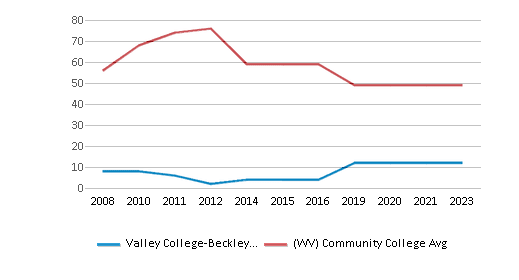
Number of Programs Offered
2
11
Student Body
The student population of Valley College-Beckley has grown by 116% over five years.
The student:teacher ratio of 20:1 has increased from 9:1 over five years.
The Valley College-Beckley diversity score of 0.80 is more than the state average of 0.42. The school's diversity has grown by 236% over five years.
Total Enrollment
234 students
433 students
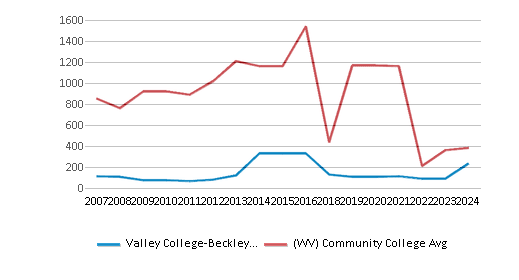
Student : Teacher Ratio
20:1
18:1
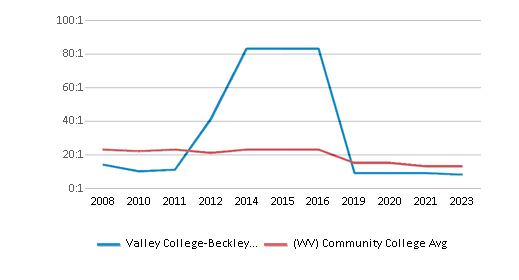
# Full-Time Students
234 students
384 students
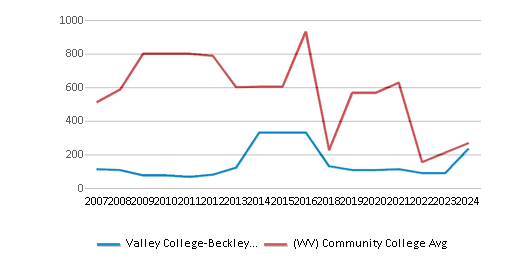
# Part-Time Students
n/a
476 students
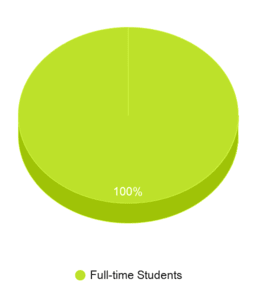
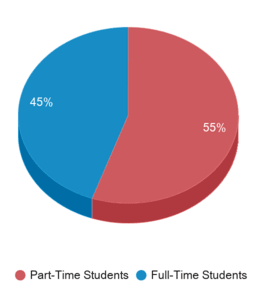
# Enrollment Undergraduate
234 students
220 students
# Full-Time Undergraduate Students
234 students
384 students
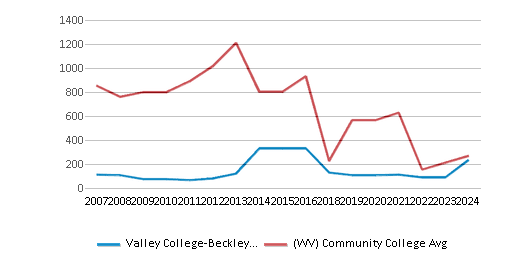
# Full-Time Graduate Students
n/a
13 students
# Part-Time Undergraduate Students
n/a
580 students
# Part-Time Graduate Students
n/a
11 students
Total Dormitory Capacity
n/a
100 students
% American Indian/Alaskan
n/a
n/a
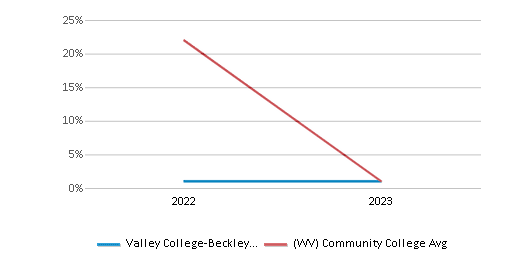
% Asian
2%
1%
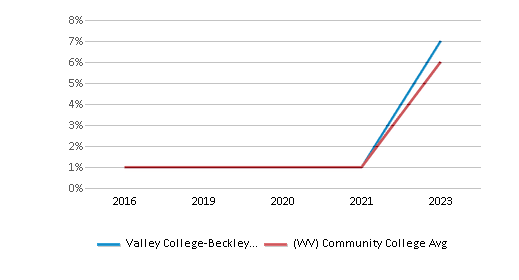
% Hispanic
n/a
4%
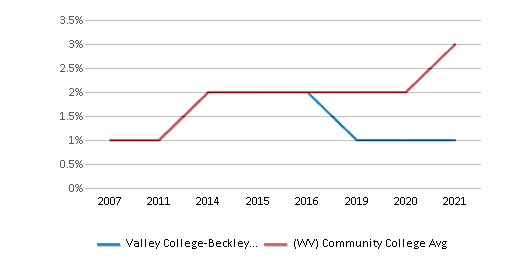
% Black
4%
8%
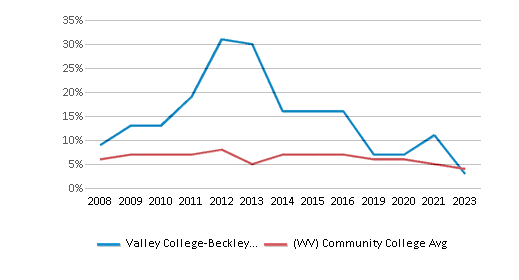
% White
40%
75%
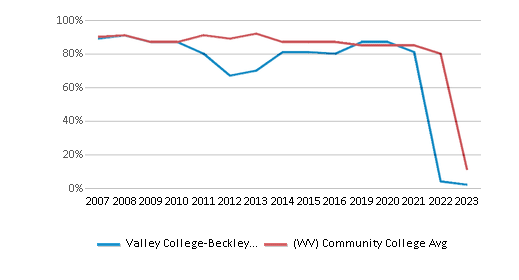
% Hawaiian
19%
4%
% Two or more races
3%
3%
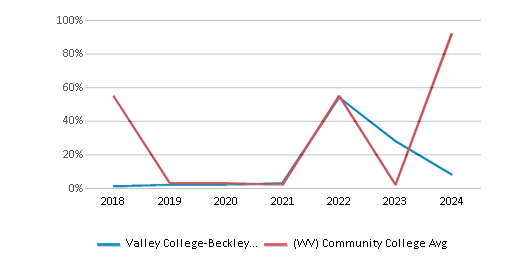
% Non Resident races
n/a
n/a
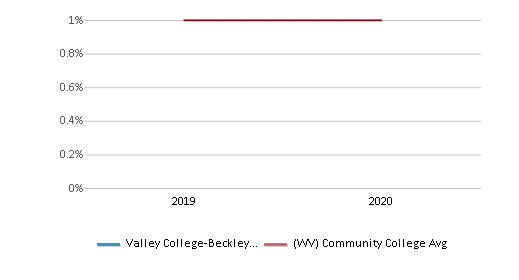
% Unknown races
31%
5%
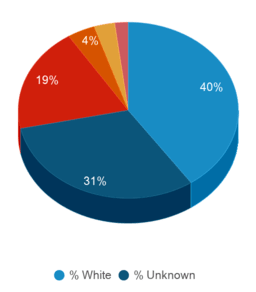
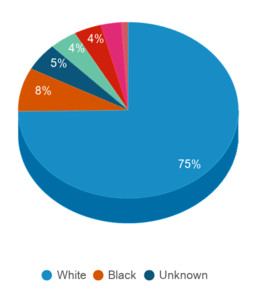
Diversity Score
0.80
0.42
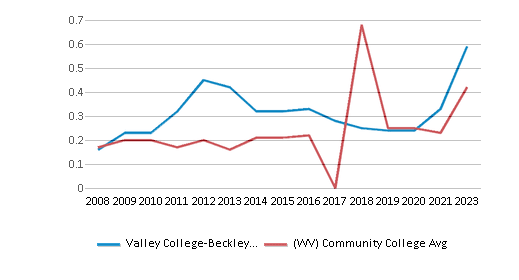
College Completion Rate (Students who graduate in less than 4 years)
0.537%
0.5357%
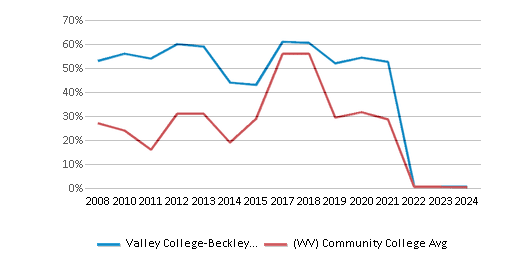
College Completion Rate (Students who graduate in 4 years or more than 4 years)
n/a
0.3003%
Average Graduate Earnings (10 Years)
$23,900
$25,000
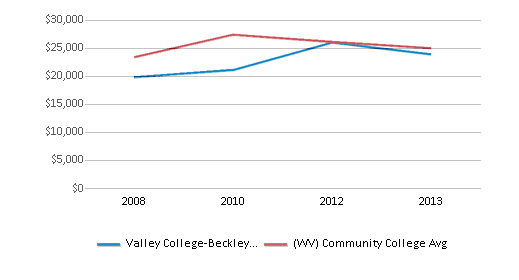
Tuition and Acceptance Rate
The private state tuition of $15,209 is more than the state average of $11,594. The private state tuition has grown by 60% over four years.
Private State Tuition Fees
$15,209
$11,594
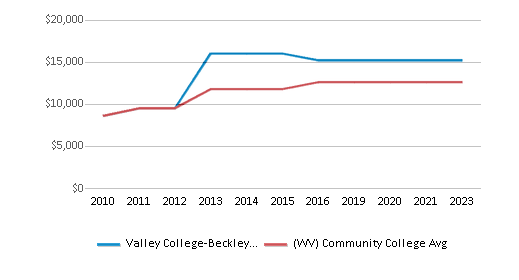
% Students Receiving Some Financial Aid
95%
90%
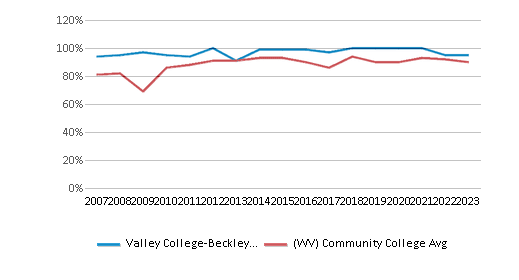
Median Debt for Graduates
$9,500
$9,500
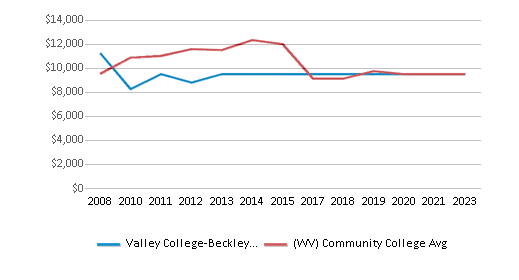
Median Debt for Dropouts
$3,709
$4,580
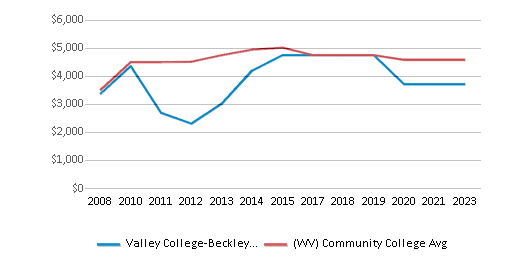
Acceptance Rate
100%
100%
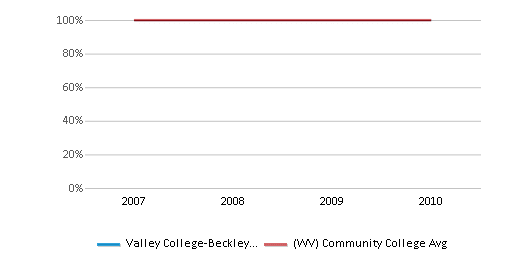
SAT Reading
n/a
450
SAT Math
n/a
460
ACT Composite
n/a
19
ACT English
n/a
19
ACT Math
n/a
18
Source: 2024 (or latest year available) Integrated Postsecondary Education Data System (IPEDS)
Frequently Asked Questions
How much does Valley College-Beckley cost?
Valley College-Beckley's private state tuition is approximately $15,209.
What is the acceptance rate of Valley College-Beckley?
The acceptance rate of Valley College-Beckley is 100%, which is equal to the state average of 100%.
What is Valley College-Beckley's ranking?
Valley College-Beckley ranks among the top 20% of community college in West Virginia for: Diversity in US community colleges.
Recent Articles

Obtaining Your Bachelor's Degree at a Community College
Explore the evolving landscape of community colleges offering bachelor's degrees, addressing affordability, accessibility, and workforce needs.

A to Z of Community College Certificates and Courses
From business and healthcare to technology and skilled trades, the article showcases the breadth of options available to students seeking to enhance their knowledge, develop new skills, or pursue career advancement.

What is a Community College?
This comprehensive guide explains what a community college is, its history, and its role in higher education. It covers the types of programs offered, differences from four-year colleges, benefits of attending, and important considerations for prospective students, providing valuable insights for those exploring educational options.





